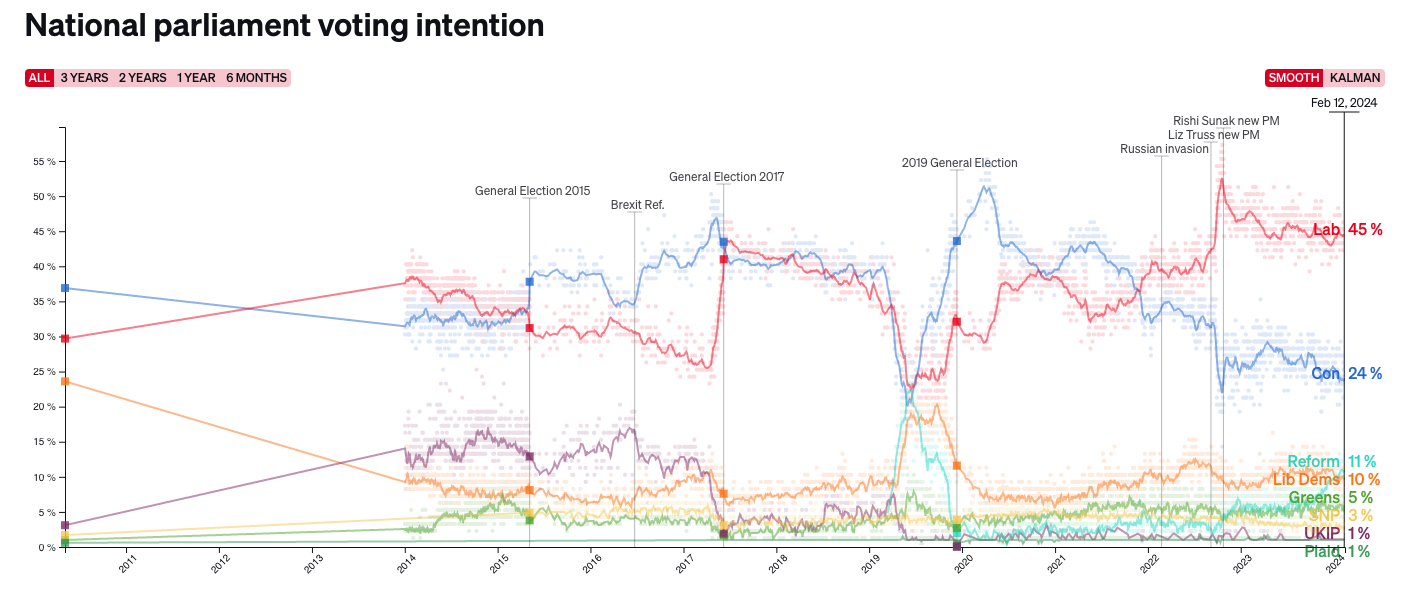This piece was first published on https://www.kenspours.com/.
10 years of opinion polls and election results highlight the Conservatives’ dire electoral situation following the Truss/Kwarteng debacle of October 2023. UK polls have now settled into a relatively stable pattern of average 18-point Labour lead over the past year or so. And there are reasons to be believe that this may not narrow significantly come polling day. From time to time in political life there comes a point when the electorate makes up its mind and nothing said can change this. For the Tories, that point was probably passed in October last year.
The UK Politico graph also tells an interesting comparative story – the relative absence of electoral volatility in 2023-4 compared with previously . Unlike in 2015, and 2019, the Conservatives don’t have a substantial Far Right voting bloc to draw on in 2024. Although looking at the Tory psychodrama around the Rwanda Bill and stopping the small boats, you could be fooled into thinking that hoovering up Reform votes might save the Conservatives from electoral oblivion. It won’t for three reasons.
Sunak’s safety first approach cannot pivot further to the Right on immigration without the potential loss of votes in the traditional Blue Wall. Second, and allied to this, Nigel Farage is in no mood to agree an electoral pact in the way that he did with Johnson in 2019. Moreover, there aren’t that many Reform votes to be had – possibly 3-4 per cent. However, the impact of Reform competition in a General Election could result in the loss of dozens of additional Tory seats to Labour. While the Telegraph has argued that Reform competition is the difference between a landslide defeat and a hung parliament, the reality is that the Tory drama and the fetish of small boats issue is their perception that visibly deporting immigrants is the probably the difference between a 1997 landslide defeat and a Canadian wipeout.
Which brings us to Starmer’s Labour and its paranoia about a Tory resurgence. Clearly traumatised by the 2015 and 2019 election defeats, Labour is also employing a safety first approach to the point that it risks undermining its own mandate to govern effectively in a first Parliament. It’s worth remembering the criticism that Tony Blair and Gordon Brown faced in 1997-98. Their commitment to two years of budget restraint totally underestimated just how shattered the Tories were.
This level of fiscal restraint was unnecessary then and it’s unnecessary now. It is unlikely that Labour will not lose any votes due to its commitment to borrow £28 billion annually for the Green Industrial Revolution. Much the reverse. It can be convincingly argued that the economy, which is on its knees, needs this kind of sustainability stimulus to kickstart the growth that Starmer continuously talks about. The section of the electorate that Labour needs are not fools – they will recognise a decent sustainability argument when they see one and I would calculate that they are in the mood for it.

